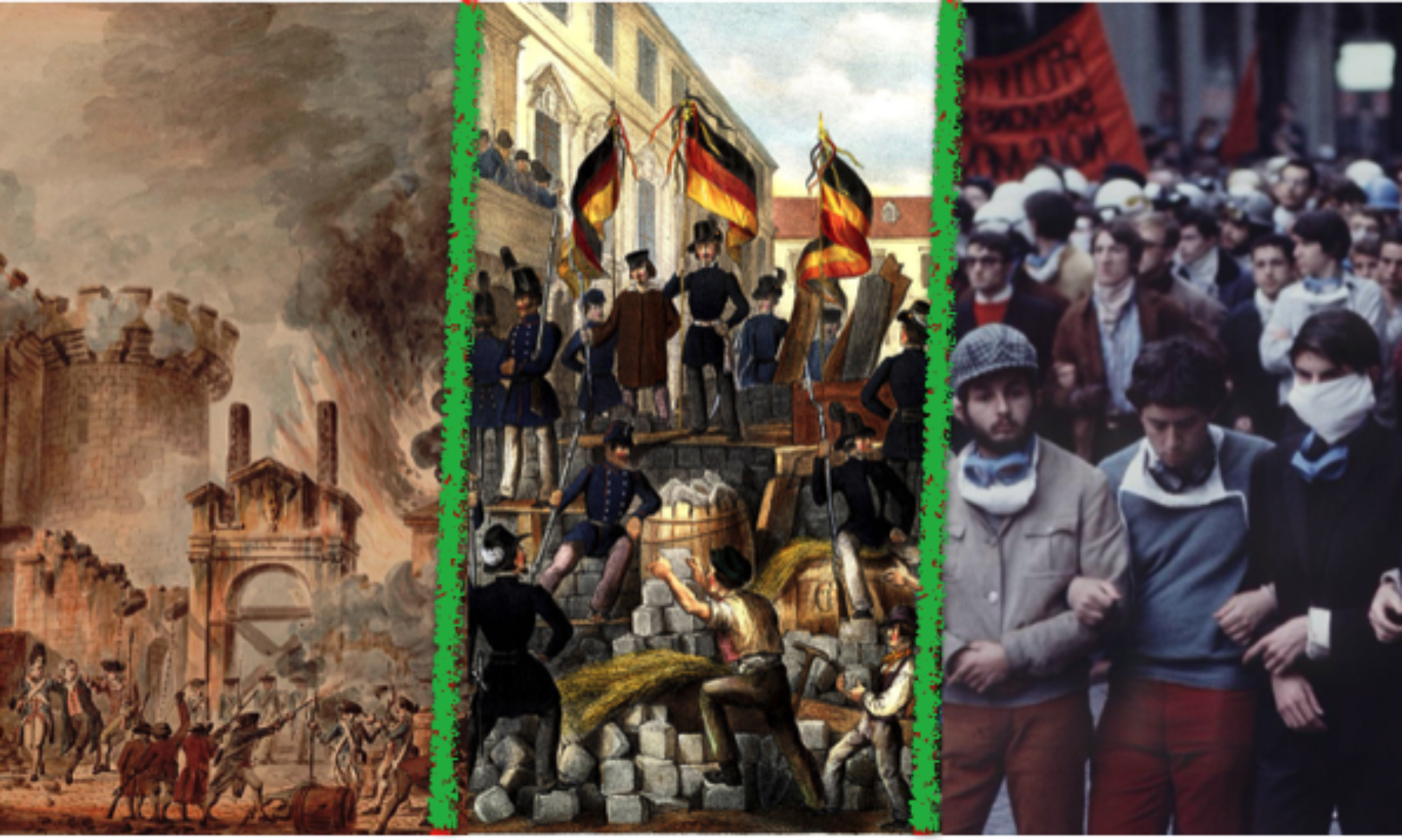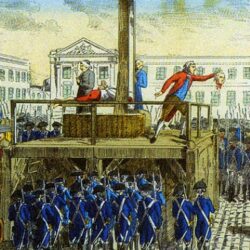For class on Thursday, we had to read the primary source titled “Street Fighting Years” The Year 1968″, which is an autobiography that recounts the events that occurred in 1968, specifically events that occurred in each month of that year. The month that I want to focus on for discussion was the month of February. In the month of February we were presented to the West Berlin SDS, a student movement that began in Germany. As noted in the source, the emergence of the SDS marked a turbulent time in Germany’s history. There was a sudden radical change in politics in Germany, given that students began to become more aware of the rise of fascism, which was something that the previous generation refused to acknowledge and combat. The source also discusses the issue of an active minority vs a passive minority, which is what I wanted to talk about for class today. To what extent can students actually be “active minorities? And is the SDS a fully politicized movement in Germany as it was in France?
The Student Revolt
In today’s reading , I found it really interesting on how far the student would go to make their point heard. While, I suppose they are risking getting a bad grade or even expelled, it is very interesting to see them not care because they know what they are doing is right and is needed to be done. You can also see how they progress in numbers. “On Friday, March 29th, while a considerable force of police surrounded the campus, five hundred students took part in the opening meeting” (The student revolt pg. 130) to “Tuesday, April 22nd, was a success: the administration could not prevent fifteen hundred people occupying the Bx
lecture theatre for the opening meeting..”(The student revolt pg 130). My question to the class would be, why did the students need to group in mass numbers? But, what if they did not group in large numbers, would they have succeeded?
Right to Education: A Rise to Protest
I found our reading’s focus on the Nanterre Movement to be very interesting because some of the students grievances seem very similar to ours. As a senior looking at graduate school, there is a constant “dollars and cents” thought plaguing my mind. I know that I want to go to professional school, and I am fairly confident that I could thrive in professional school. However, I probably will not be going to professional school next year because it is cost prohibitive. This is how it is for a lot of people I know.
I know it is a hot button issue in our political climate, but education should not be a financial burden. We should want an educated populous, so I am going to say it: we should taxpayer fund education. You can come for me in the comments, I am not going to budge. Education should be a right, not a privilege. (And, if you think college should be a temple of the elite, we cannot vibe.) Anyway, I digress. I found the quote, “It was interesting to see the UEC call for the efficient running of a bourgeois university in which certain ‘left’ or even ‘Marxist’ professors were afraid of a challenge to their status in that bourgeois university” (Bourges 131). I found this quote interesting because we have seen this pattern before: people who have nothing to gain that out weighs the gains of others being silent. I was wondering what you think the role of the “adult/establishment” is in social change? Can the protester and the establishment ever work together to change/dismantle/reform the “apparatus” or are people so fickle that rights must be taken from the establishment?
Students’ Place in Revolution
In another class we discussed boomers and how they were in a way defined by being anti-establishment, but this reading made me question that a bit. I do agree that with events such as the counterculture movement and protests in general, that they were upset with the establishment, but I guess my question has more to do with WHY did they become anti-establishment. On page 155, in response to police brutality in the United States towards people who oppose the Vietnam War: “yknow if you’re a nice respectable law abiding white kid, it’s very terrifying to see policemen armed to the teeth coming at you with every intention of putting you in the hospital.” This quote doesn’t read as much anti-establishment as much as it reads “hey, what are you doing I’M supposed to be a PART of the establishment.” (Of course, I am referring specifically to the predominantly white student portion of protestors for this one).
The March 22nd Movement
For class on Tuesday, we had to analyze “The March 22nd Movement” which was a student revolt that occurred outside the University of Nanterre in May 1968 in France. As stated in this reading, the student revolt was established with the purpose of improving their working conditions at the university. This reading touches on various aspects of the nature of the movement, but the one I want to focus on for discussion is the aspect that the movement was a politicized one. The movement itself was one that as the reading states was built upon non-union topics. But given that this was a fully politicized movement and many previous politicized movements proved to fail (*cough* the French Revolution *cough*) how successful can this movement be considered? And how can these students of Nanterre ensure that the changes that they achieve are not simply a in the moment change but instead a long term one?
A Good Rallying Cry?
When reading have the assigned have pages of 1968 a student generation in revolt, one line particularly stood out to me. This line was in the 2nd to last paragraph of page 144. The line was “students are the Jews of today”, this was a rallying cry as the students felt like they were being oppressed as the Jews were during World War Two. A personal fact about me is that I have an Aunt who works for the Holocaust museum. Last year the museum published an article calling people to stop using Holocaust analogies to describe the politics of modern times. My question is, do you think it was a good move for the students to compare themselves to the Jews during World War Two? Do you think people would be more likely to support their cause after hearing this statement?
https://www.ushmm.org/information/press/press-releases/why-holocaust-analogies-are-dangerous
Situationism
In this chapter we are presented to a new form of practice, Situationist Practice. Situationism revolved around the artistic and creative sphere when it was first put into movement. Soon after, their conviction and drive for meanings began to change the direction of the movement itself. One of the biggest focuses for Situationists was the study of non-alienated life. However, as noted in the text, the movement itself hit a standstill and in order to speed up the process, situationists began to create scenarios for anyone that was willing to listen to what it is that they had to say with regards to non-alienated life. At the time, it was considered an absurdity what situationists were promoting, but I wanted to ask the class this: If you were to listen to a situationist, would you be skeptical about life as well? Or would you need more hard found proof? And what would you say to counter the Situationists belief in their movement?
Lettrists and Situationists Tactics
On page 11, the text mentions that both the Lettrists and the Situationists needed to do something bigger to get an audience and attention. Do you think their tactics worked? Is putting on a “bigger show” making a strong statement or is it doing the opposite?
Rights of Man and of the Citizen

Even though it says 1600s, it is still fitting for the 1700s-1800s (I just found it on my Instagram feed). This would’ve went well with my editorial presentation or back when we were actually in this time period, but I thought I should still share it. 🙂
MARLON BRANDO IS A COMMUNIST! (and other wild ideas)
Today’s reading gives us a brief overview of the fundamentals of the 1968 Youth Protests. While we spent most of our time right after World War II and in the 1950s, I found myself really interested in the idea of protesting for the ability to protest. We are told on page 26 that, “For the most part, in the late 1950s the spirit of rebellion remained unfocused, diffused, and non-specific. Symptomatic for the state of affairs was the following exchange in the cult film The Wild Ones. When Marlon Brando, the leader of a biker gang, was asked: ‘What are you rebelling against?’, he answered: ‘What have you got?'”.
My questions are simple: What is interesting to you in this chapter? I know that I am madly in love with the title communist being assigned to Brando because they could not find a better way to summarize “‘radical’, ‘unorthodox’ , ‘anti-authoritarian’ , or ‘uncompromisingly oppositional'” (30). Other food for thought, you probably know someone who was in their teens or twenties in the 50s and 60s, what do you think those people where doing? We finally reached a part of history were we personally know people who lived threw it!
Also, here are The Beatles doing their thing. I was looking for a meme, but could not find one.

